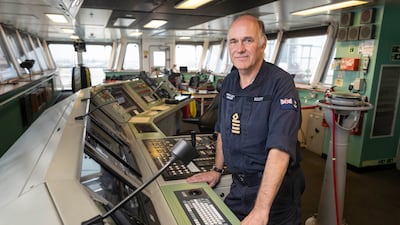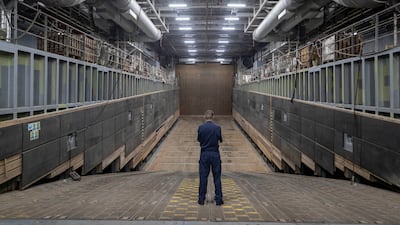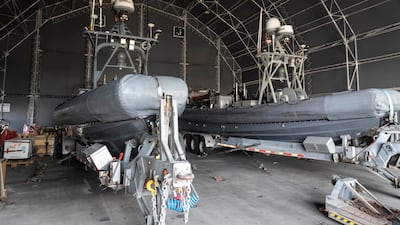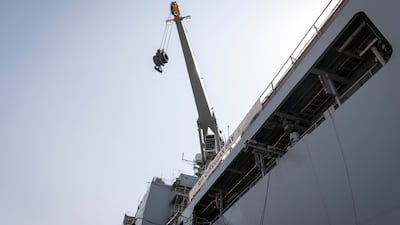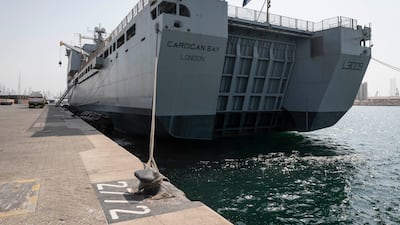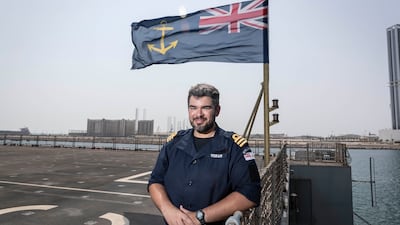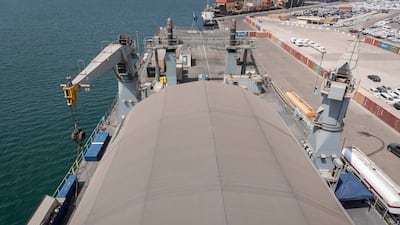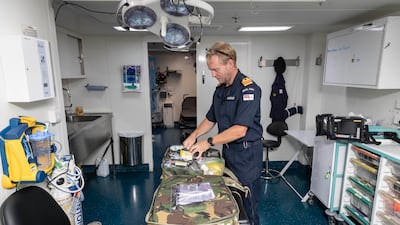A vast naval vessel drifted into Port Rashid on Tuesday. The ship is a temporary fixture on the maritime landscape in Dubai and a sign of the continuing operations to keep shipping channels free from disruption.
Ensuring the seas remain open for business is the task of the Royal Fleet Auxiliary Cardigan Bay, which has been described as the Swiss Army knife of the seas owing to its versatility.
It is capable of supporting UK Royal Navy mine-sweeping operations in the Arabian Gulf.
Royal Navy
It is on a four-day deployment in Dubai as part of the long-standing Operation Kipion to maintain regional maritime safety, protect shipping lanes and preserve the global trade of oil.
Providing vital support
The UK's Royal Navy has four mine-sweeping vessels operating in the region.
But without the support of the 176-metre Cardigan Bay and its crew of 126 supplying food, ammunition and logistical cover, it would be far more challenging for Commander Adrian Visram, who leads the UK’s mine countermeasures force.
“This area is the crossroads of the world and is vital to maintaining the integrity of global shipping,” he said.
“We are conscious of what is happening in Ukraine, of course. While it has not directly impacted on my force out here, the UK has been training the Ukrainian navy in mine warfare operations.
“Our ability to help Ukraine is key. As we have seen, most economies rely on maritime trade.
“The UK is sea blind, but huge containers come into the country, in a similar way to the UAE, so the ability to get goods in and out is hugely important for freedom around the world."
The Strait of Hormuz and Suez Canal are key areas of concern, as are the Strait of Gibraltar, Strait of Malacca and the Bosphorus, which is vital for grain exports from Ukraine.
“Ukraine is one of the world’s bread baskets, so to not get that grain to market from the Black Sea is causing serious economic repercussions and societal failures around the world," Commander Visram said.
“The impact cannot be underestimated, it is a global problem.”
Built for months at sea
The Cardigan Bay has a large loading bay for amphibious vehicles, a 12-bed hospital, an operating theatre, extensive accommodation for more than 300 crew, a gym and several areas for recreation.
It was initially designed to carry and offload Royal Marines and their equipment – up to 400 people, as well as 150 lorries or 24 tanks, all at once.
Its landing deck is capable of receiving Chinook and V-22 Osprey helicopters, as well as the US CH 53 Sea Dragon minehunter helicopter, a potent tool in regional anti-terrorism operations.
Vast, winding corridors and steep stairwells give way to cavernous hangars and shipping decks.
It is a vessel built to fulfil the demands of months at sea.
On board, crew welfare is critical to fleet operations. May 27 marked the 10th anniversary of the last sighting of British sailor Timmy MacColl, who went missing from the warship HMS Westminster as it was docked in Port Rashid.
He has never been found and was declared dead, presumed drowned, by the Royal Navy in 2014.
Since then, crew on the Cardigan Bay subscribe to "shark watch", a protocol that requires one service member to check-in any crew that return from a night out in Dubai.
“It is something we have strict rules on,” Commander Visram said.
“To lose someone on shore outside of wartime was unthinkable. It can’t happen again.”
Non-stop presence in the Gulf
Since the start of the Iran–Iraq War in September 1980, units of the Royal Navy and the Royal Fleet Auxiliary have constantly been on patrol in the Gulf.
The naval presence in the region comprises helicopters, dock landing ships and a minehunter squadron.
Capt Simon Booth is on his final tour of duty on board the Cardigan Bay after a 41-year career in the Royal Fleet Auxiliary.
“Shipping is a high-risk game, as these waterways are relatively easy to disrupt," he said.
“Investing in merchant ships as well as war-fighting capabilities is something the UK, UAE and all our partners need to do to provide a ready supply.
“We run out of seafarers at our peril. The impact of the pandemic has been quite marked, with many leaving the service because they were treated so poorly.”
Capt Booth said strong relations between the UK and UAE were critical for regional stability in the shipping industry.
“We have 2,000 metres of space and a huge flight deck to support our allies," he said.
“It is a bit more than a floating supermarket and can help the fleet sustain operations at sea for months at a time with food, fuel and munitions.”
